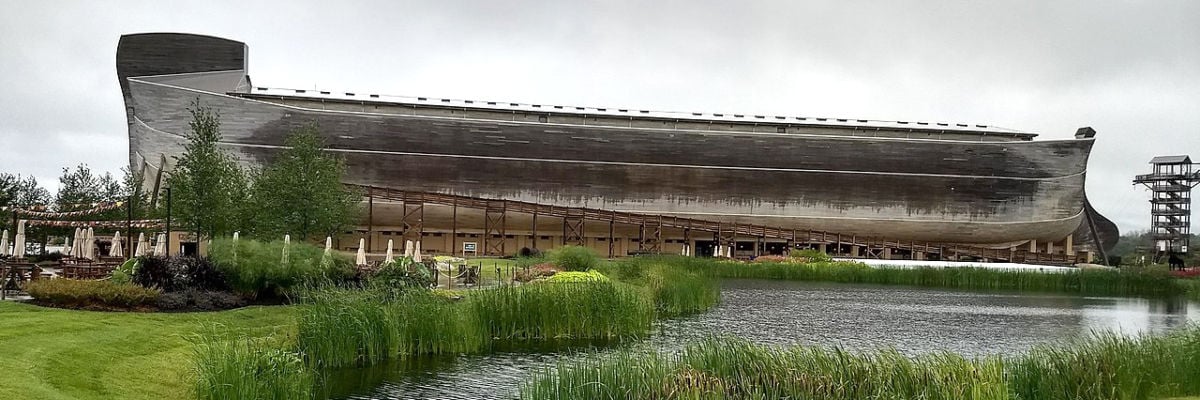
A new Christian tourist attraction, Ark Encounter, opened its doors this month in Williamstown, Kentucky, and thousands have already flocked to see the $100 million, life-size recreation of Noah’s Ark. According to CNN.com:
The massive exhibit, claimed to be the largest timber frame structure in the world, sits on the grounds of a Christian theme park, Ark Encounter, a for-profit enterprise founded by Ken Ham. He said the park is an evangelical tool aimed at teaching creationism, a literal interpretation of the Bible’s book of Genesis. “I find some of the aggressive secularists try to shut down people talking about the Bible,” Ham said. “So for us it’s, ‘How can we get a message out there about the Bible?’”
Critics say the attraction contradicts the conclusions of modern science. Bill Nye, who previously debated Ham on the subject of creationism versus evolution, recently visited the park and said, “On the third deck [of the ark] every single science exhibit is absolutely wrong. Not just misleading but wrong.” The article quoting Nye goes on to say Ham’s exhibit represents “a big departure from the science of evolution” and says “there’s no evidence to suggest an epic, worldwide flood occurred within the past 6,000 years.”
So is the story of Noah’s Ark an example of science contradicting religion, as Nye says? Is it an example of how we should trust Scripture instead of mainstream science, as Ham says? Or is there a third option?
How widespread was the flood?
The main complaint critics have about the story of Noah’s Ark is that there is no evidence the whole earth was ever inundated by a flood.[1] They say it is more likely that the Genesis account is a retelling of an earlier Babylonian myth called the Epic of Gilgamesh. In that story, a council of gods floods the earth and selects one man, Utnapishtim, to gather animals aboard a cube-shaped boat. After the flood, Utnapishtim releases a bird to find land and offers a sacrifice to the gods, just the way Noah did.
Accounts of a massive flood in the ancient Near East should serve to corroborate the Genesis account, not contradict it. Geologists have discovered that melting glaciers near the Black Sea could have caused the collapse of giant ice dams about 7,000 years ago.[2] Such an event would have triggered sudden, massive flooding across a wide area, which would have served as the basis for all the flood accounts in the region.
The article that reported Bill Nye’s reaction to the Ark says “some scholars are open to the idea that a historic flood of biblical proportions could have happened and inspired the Noah tale.” David Montgomery reaches the same conclusion in his 2012 book The Rocks Don’t Lie: A Geologist Investigates Noah’s Flood. Montgomery says the geological evidence refutes the claim there was a worldwide flood, but he also says, “I now believe that there is no way to tell whether Noah’s flood was the Black Sea flood or a major Mesopotamian flood. No matter how intriguing either idea may sound, both offer seemingly reasonable explanations” (223).
What is the flood narrative’s genre?
The Catholic Church does not prohibit interpretations of Genesis 6-8 that include a worldwide flood, but neither does the Church require there to be a worldwide flood in all interpretations of these passages. Instead, Catholic theologians understand the first eleven chapters of Genesis contain, in the words of Pope Pius XII, “simple and metaphorical language adapted to the mentality of a people but little cultured, both state the principal truths which are fundamental for our salvation, and also give a popular description of the origin of the human race and the chosen people” (Humani Generis, 38).
Modern readers may interpret passages in Genesis that describe water covering “the earth” as meaning that the entire planet was inundated. But a resident of ancient Mesopotamia may have understood the “the earth” to mean only “the land” or the region he knew. In fact, the Hebrew word for “earth” used in this passage, eretz, can also mean “land,” as in Genesis 41:57, where it says that “all the eretz came to Egypt to buy grain” when a famine struck the region. This doesn’t mean that everyone on the planet went to Egypt to buy grain, just those people who inhabited the region to which the author was referring.
The author of Genesis may have also used popular storytelling devices found in other flood narratives in order to show how the God of the Israelites was superior to pagan deities. For example, in the Epic of Gilgamesh the gods are afraid of the flood and flee to higher ground, but in the Genesis story God is in complete control of the disaster and is unaffected by it.
The Epic of Gilgamesh seems to have been derived from an even older story called the Epic of Atrahasis. In this story, a pantheon of gods floods the earth because human beings had become too numerous and noisy. The author of the Genesis account may even have been purposefully subverting this anti-life attitude in his own narrative in which God commands that Adam and Eve “be fruitful and multiply.” God’s decision to send the flood in judgment of sin instead of as a population control measure would be a further subversion of this theme. Pope Pius XII acknowledged that:
If, however, the ancient sacred writers have taken anything from popular narrations (and this may be conceded), it must never be forgotten that they did so with the help of divine inspiration, through which they were rendered immune from any error in selecting and evaluating those documents (Humani Generis, 38).
Just as the Creation story communicated spiritual truths about God and the significance of humanity through figurative language, the story of Noah’s flood in Genesis 6–8 (as well as the Tower of Babel in Genesis 11) uses similar language to communicate truths about God’s attitude toward sin and redemption. The fact that the author chose to model his stories after existing narratives and literary conventions does not disprove the message he was communicating: that it was the true God and not any of his pagan competitors who intervened to save the survivors of the flood that devastated the land.
* * *
If you would like to learn more about how to explain difficult passages of Scripture, check out Trent Horn’s new book, Hard Sayings: A Catholic Approach to Answering Bible Difficulties.
Notes
[1] The other common complaint is that Noah could not have built a vessel like the Ark nor cared for all the animals inside of it. But even if God sustained the Ark and its occupants with a series of miracles, that would not explain the lack of evidence for a global flood, thus making this the biggest objection to a literal view of Noah’s flood.
[2] For an explication of Noah’s flood being a Black Sea flood, see William Ryan and Walter Pitman, Noah’s Flood: The New Scientific Discoveries about the Event that Changed History (New York: Simon & Schuster, 2000).



